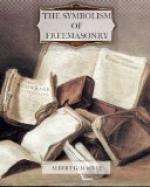PHALLUS. A representation of the virile member, which was venerated as a religious symbol very universally, and without the slightest lasciviousness, by the ancients. It was one of the modifications of sun worship, and was a symbol of the fecundating power of that luminary. The masonic point within a circle is undoubtedly of phallic origin.
PHILOSOPHY OF FREEMASONRY. The dogmas taught in the masonic system constitute its philosophy. These consist in the contemplation of God as one and eternal, and of man as immortal. In other words, the philosophy of Freemasonry inculcates the unity of God and the immortality of the soul.
PLUMB. One of the working tools of a Fellow Craft, and a symbol of rectitude of conduct.
POINT WITHIN A CIRCLE. It is derived from the ancient sun worship, and is in reality of phallic origin. It is a symbol of the universe, the sun being represented by the point, while the circumference is the universe.
PORCH OF THE TEMPLE. A symbol of the entrance into life.
PRIMITIVE FREEMASONRY. The Primitive Freemasonry of the antediluvians is a term for which we are indebted to Oliver, although the theory was broached by earlier writers, and among them by the Chevalier Ramsay. The theory is, that the principles and doctrines of Freemasonry existed in the earliest ages of the world, and were believed and practised by a primitive people, or priesthood, under the name of Pure or Primitive Freemasonry. That this Freemasonry, that is to say, the religious doctrine inculcated by it, was, after the flood, corrupted by the pagan philosophers and priests, and, receiving the title of Spurious Freemasory, was exhibited in the ancient Mysteries. The Noachidae, however, preserved the principles of the Primitive Freemasonry, and transmitted them to succeeding ages, when at length they assumed the name of Speculative Masonry. The Primitive Freemasonry was probably without ritual or symbolism, and consisted only of a series of abstract propositions derived from antediluvian traditions. Its dogmas were the unity of God and the immortality of the soul.
PROFANE. One who has not been initiated as a Freemason. In the technical language of the Order, all who are not Freemasons are profanes. The term is derived from the Latin words pro fano, which literally signify “in front of the temple,” because those in the ancient religions who were not initiated in the sacred rites or Mysteries of any deity were not permitted to enter the temple, but were compelled to remain outside, or in front of it. They were kept on the outside. The expression a profane is not recognized as a noun substantive in the general usage of the language; but it has been adopted as a technical term in the dialect of Freemasonry, in the same relative sense in which the word layman is used in the professions of law and divinity.
PURE FREEMASONRY OF ANTIQUITY. The same as Primitive Freemasonry,—which see.




